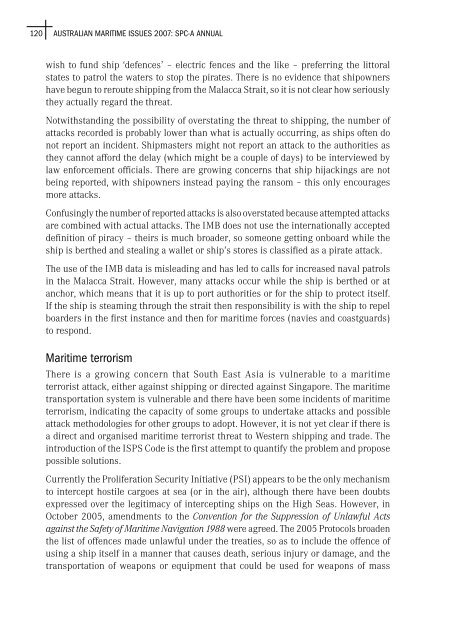Australian Maritime Issues 2007 - Royal Australian Navy
Australian Maritime Issues 2007 - Royal Australian Navy
Australian Maritime Issues 2007 - Royal Australian Navy
You also want an ePaper? Increase the reach of your titles
YUMPU automatically turns print PDFs into web optimized ePapers that Google loves.
120 AUSTRALIAN MARITIME ISSUES <strong>2007</strong>: SPC-A ANNUAL<br />
wish to fund ship ‘defences’ – electric fences and the like – preferring the littoral<br />
states to patrol the waters to stop the pirates. There is no evidence that shipowners<br />
have begun to reroute shipping from the Malacca Strait, so it is not clear how seriously<br />
they actually regard the threat.<br />
Notwithstanding the possibility of overstating the threat to shipping, the number of<br />
attacks recorded is probably lower than what is actually occurring, as ships often do<br />
not report an incident. Shipmasters might not report an attack to the authorities as<br />
they cannot afford the delay (which might be a couple of days) to be interviewed by<br />
law enforcement officials. There are growing concerns that ship hijackings are not<br />
being reported, with shipowners instead paying the ransom – this only encourages<br />
more attacks.<br />
Confusingly the number of reported attacks is also overstated because attempted attacks<br />
are combined with actual attacks. The IMB does not use the internationally accepted<br />
definition of piracy – theirs is much broader, so someone getting onboard while the<br />
ship is berthed and stealing a wallet or ship’s stores is classified as a pirate attack.<br />
The use of the IMB data is misleading and has led to calls for increased naval patrols<br />
in the Malacca Strait. However, many attacks occur while the ship is berthed or at<br />
anchor, which means that it is up to port authorities or for the ship to protect itself.<br />
If the ship is steaming through the strait then responsibility is with the ship to repel<br />
boarders in the first instance and then for maritime forces (navies and coastguards)<br />
to respond.<br />
<strong>Maritime</strong> terrorism<br />
There is a growing concern that South East Asia is vulnerable to a maritime<br />
terrorist attack, either against shipping or directed against Singapore. The maritime<br />
transportation system is vulnerable and there have been some incidents of maritime<br />
terrorism, indicating the capacity of some groups to undertake attacks and possible<br />
attack methodologies for other groups to adopt. However, it is not yet clear if there is<br />
a direct and organised maritime terrorist threat to Western shipping and trade. The<br />
introduction of the ISPS Code is the first attempt to quantify the problem and propose<br />
possible solutions.<br />
Currently the Proliferation Security Initiative (PSI) appears to be the only mechanism<br />
to intercept hostile cargoes at sea (or in the air), although there have been doubts<br />
expressed over the legitimacy of intercepting ships on the High Seas. However, in<br />
October 2005, amendments to the Convention for the Suppression of Unlawful Acts<br />
against the Safety of <strong>Maritime</strong> Navigation 1988 were agreed. The 2005 Protocols broaden<br />
the list of offences made unlawful under the treaties, so as to include the offence of<br />
using a ship itself in a manner that causes death, serious injury or damage, and the<br />
transportation of weapons or equipment that could be used for weapons of mass
















